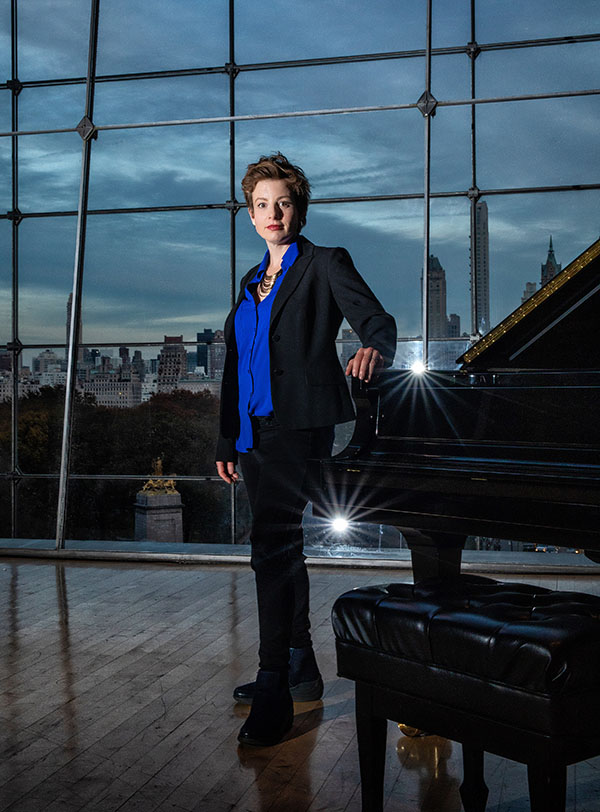
Cat Tate Starmer ’98, an award-winning freelance theatrical and architectural lighting designer based in New York City. Starmer, who is pictured in The Appel Room at Fredrick P. Rose Hall, home of Jazz at Lincoln Center, graduated from Appalachian in 1998 with a B.A. in theatre arts. Photo by Troy Tuttle
BOONE, N.C. — While attending Appalachian State University, Cat Tate Starmer ’98 didn’t want to be in the spotlight — she wanted to operate it. Now she is an award-winning freelance theatrical and architectural lighting designer based in New York City.

Cat Tate Starmer ’98, an award-winning freelance theatrical and architectural lighting designer based in New York City. Starmer, who is pictured in The Appel Room at Fredrick P. Rose Hall, home of Jazz at Lincoln Center, graduated from Appalachian in 1998 with a B.A. in theatre arts. Photo by Troy Tuttle
Starmer has designed lighting on and off Broadway and in regional theaters across the country, as well as in showcase restaurants, hotels and casinos. She has earned awards for lighting in both the theatrical and architectural fields, including the 2018 LIT Lighting Designer of the Year Award for Theater Performance Design and Lumen Awards from the Illuminating Engineering Society in New York.
Starmer graduated cum laude from Appalachian with a B.A. in theatre arts. During her education, Starmer said she learned about stage management and also was able to act, direct and design.
“I developed a well-rounded view of how theater works, understanding how important and challenging each person’s job is,” Starmer said.
Experiential learning
Starmer gained practical work experience in Appalachian’s theaters. She was trained to serve as master electrician at the Valborg Theatre, where she worked for two years.
“I learned so much about lighting,” Starmer said of the experience. “That was my first step toward being a lighting designer. Prior to that job, I was completely intimidated by the technology.”
Starmer also worked on the events team at Farthing Auditorium — now Appalachian’s Schaefer Center for the Performing Arts — managing sound, lighting and other aspects of production.
“At the age of 21, I lit a Doc Watson concert,” Starmer shared. “Working at the auditorium was a formative experience for me.”
After graduating, Starmer was hired full time as an assistant technical director at the auditorium, where she served for two years. “I learned about sound, touring productions and management — and matured both personally and as a designer,” she said.
Starmer fondly remembers two mentors in particular from her time at Appalachian: Dr. Frank Mohler, emeritus professor in the Department of Theatre and Dance, and former Farthing Auditorium Director Greg Williams.
She said when she left Appalachian, she was confident and prepared to be a freelance lighting designer.
Shining on her own
As a freelancer, one of the most challenging parts of her job is the constant stream of new elements, Starmer said. “A new theater, an unfamiliar staff, a new director or a new play that is evolving with us — it is like the first day of school. It’s thrilling because magic can happen, but scary because of the constant threat of the unexpected.”
After graduating from Appalachian, Starmer earned a master’s degree in design from the Yale School of Drama and moved to New York City.
Her flourishing career took her to Broadway, she said, which was her dream. “However, after a few years, my work started to feel less inspired and more like an endurance test,” Starmer said.
Her Appalachian roots inspired her next move.
“I realized the theater I loved making started back at Appalachian, where I worked on a production called ‘Pieces of She.’ It was produced every year, and women served in all roles — writers, directors, actors and tech. I loved working on that project — and wanted to do more of that,” she said.
Starmer began working with theater companies targeting the underserved and underrepresented.
“I work with the August Wilson Monologue Competition, which brings students from all over the country to perform on a Broadway stage,” she said. “I’ve had the honor of being on the first all-female design teams at the Guthrie Theater (in Minneapolis, Minnesota), the Old Globe Theatre (in San Diego, California) and the Alabama Shakespeare Festival.”
She is also working on an ongoing production of “Hold These Truths,” a one-person show about the real-life character of Gordon Hirabayashi, a Japanese American pacifist who was imprisoned for refusing to join his family at the Japanese internment camps in the U.S. during World War II.
“I love being a part of creating art that lifts people up and tells important stories,” Starmer said.
Starmer said her favorite part of the job is seeing the finished production, looking back at all the work that went into it.
In spite of her notable work and accolades, Starmer said her greatest achievement is having a family while working in the theater industry. She and her husband have two boys, age 6 and 8, and Starmer brings them to work with her whenever she can.
“The theater world is not known to be family friendly, so I’m proud to be a part of changing the system — showing younger theater-makers they don’t have to give up kids for a life in the arts. I’m following my dream, and my kids can see that. They know how important it is to live your truth.”
What do you think?
Share your feedback on this story.
About the Department of Theatre and Dance
The Department of Theatre and Dance is one of seven departments housed in Appalachian’s College of Fine and Applied Arts. Its mission is to facilitate transformative experiences for students and the public, which cultivate compassionate, creative and collaborative communities through theatre and dance. The department also offers coursework for integrated learning through the arts to the general university student population. Its dynamic co-curricular production program provides exemplary theatre and dance experiences to departmental students, the university community and the region. Learn more at https://theatreanddance.appstate.edu.
About the College of Fine and Applied Arts
Appalachian State University’s College of Fine and Applied Arts is a dynamic and innovative group of seven academic departments, bringing together a variety of perspectives, experiences and real-world education to provide unique opportunities for student success. The college has more than 3,500 undergraduate and graduate majors. Its departments are Applied Design, Art, Communication, Military Science and Leadership, Sustainable Development, Sustainable Technology and the Built Environment, and Theatre and Dance. Learn more at https://cfaa.appstate.edu.
About Appalachian State University
As a premier public institution, Appalachian State University prepares students to lead purposeful lives. App State is one of 17 campuses in the University of North Carolina System, with a national reputation for innovative teaching and opening access to a high-quality, cost-effective education. The university enrolls more than 21,000 students, has a low student-to-faculty ratio and offers more than 150 undergraduate and 80 graduate majors at its Boone and Hickory campuses and through App State Online. Learn more at https://www.appstate.edu.











![How NCInnovation Is Rethinking Economic Development in North Carolina [faculty featured]](/_images/_posts/2026/02/rethinking-economic-development-600x400.jpg)






